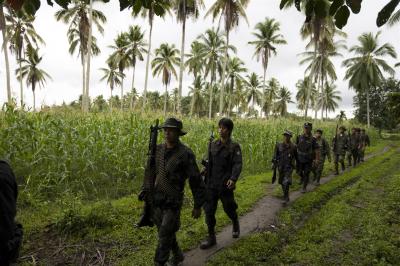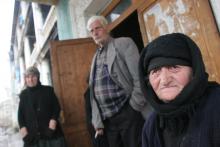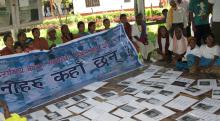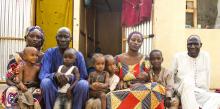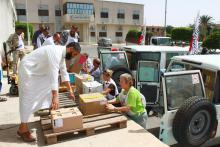Case prepared by Enrica Giunta, Ada Seelinger and Nina Steinmetz, students at Roma Tre University under the supervision of Giulio Bartolini (Professor), Laura Di Gianfrancesco (PhD student), Roma Tre University IHL Legal Clinic.
A. SERIES OF RELEASE OF DETAINED PERSONS BY THE NEW PEOPLE’S ARMY
[Source: Philippine Peace Center, ‘The GRP-NDFP Peace Negotiations - Historical Overview’, Link not available]
The armed conflict between the Philippine government and the National Democratic Front of the Philippines has been raging for more than four decades. On December 26, 1968, the Communist Party of the Philippines (CPP) was re-established with the avowed objective of seizing political power through a protracted people’s war, setting up a people’s democratic state and building a socialist society. The CPP established the New People’s Army (NPA) as its military arm in March 1969, and the National Democratic Front of the Philippines (NDF or NDFP) in 1973 as a broad alliance of mass organizations fighting for national freedom and democracy. […]
GRP [Government of the Republic of the Philippines] President Estrada unilaterally suspended the formal talks […] in February 1999 after the New People’s Army (NPA) captured and detained four AFP and PNP [Philipines National Police] officers in succession in Mindanao and Bicol: General Obillo and Maj. Montealto in Davao del Norte, P/Maj Bernal in Bicol, and Sgt. Lozada in Surigao Sur.
From April 9-27, 1999 the NDFP released, as a goodwill and confidence-building measure and for humanitarian reasons, five AFP and PNP officers (the four above plus a PA intelligence agent, Sgt. Wilfredo Demol, who was arrested by the NPA a year earlier).
[…]
[…]
The Communist-led New People´s Army (NPA) released Police Chief Inspector Roberto Bernal and Army Sergeant Alipio Lozada, rekindling hopes that peace talks with the government could be revived.
The two captives were released separately to a team led by [an] International Committee of the Red Cross representative […].
Bernal, seized Feb. 20, [1999] was the first of five NPA prisoners expected to be released. He was set free at 7 a.m. April 9 at the El Retiro Retreat House in Sorsogon, 370 kilometers southeast of Manila.
Bernal was given a medical checkup and met with Romeo Capulong, legal consultant to the National Democratic Front, leftist umbrella group. He then met with others including his wife, a daughter, Bishop Jesus Varela of Sorsogon and Senator Loren Legarda.
Lozada, captured March 5, was released at 3:30 p.m. April 11 in the village of Diacogon in Llanga, Surigao del Sur, 800 kilometers southeast of Manila. He was welcomed by Legarda and Redemptorist Bishop Ireneo Amantillo of Tandag.
[…]
The releases were negotiated at talks in the Netherlands between leftist leaders in exile and an independent humanitarian mission led by Archbishop Fernando Capalla of Davao and Bishop Wilfredo Manlapaz of Tagum. It was conditional on a halt in military operations to free the men.
Lozada, who said he was treated well by his captors, was brought to an army camp in Cagayan de Oro City for a medical checkup and debriefing.
[…]
[…] Two soldiers held captive by the communist New People’s Army (NPA) in Bicol for five months were finally released here yesterday after more than three weeks of negotiations to secure their freedom.
NPA spokesman Gregorio Rosal said Army 1st Lt. Ronaldo Fidelino and Pfc. Ronel Nemeño, both of the 452nd Infantry Battalion, were released after an agreement for the police and military to suspend counterinsurgency operations for 10 days in the provinces of Albay and Camarines Sur.
[…]
The two soldiers were formally turned over by the NPA to chief government peace negotiator Silvestre Bello III in a simple ceremony at around 5:50 p.m. yesterday in Barangay Tanauan in this town.
[…]
Rosal, for his part, said the release of Fidelino and Nemeño is part of the agreement made by the Philippine negotiating panel and the NDF.
"The process of freeing the POWs (prisoners of war) was agreed upon by the Philippine negotiating panel and the National Democratic Front of the Philippines," Rosal said.
The two soldiers were seized in Camarines Sur on March 1 after a clash. The government initially refused to negotiate for their release despite ongoing peace talks.
An Act Of Good Faith
President Arroyo said the release of the two soldiers by the NPA augurs well as a confidence building measure for both sides to continue the peace talks.
"I thank God for the safety of these soldiers and for the peace of mind that has been restored their loved ones," Mrs. Arroyo said.
"We must continue to push the frontlines of peace through negotiations and confidence building as we try to heal the wounds of the past and carry on our mission forward across uncertain times," she said in a statement.
Mrs. Arroyo said the release of Fidelino and Nemeño culminated the "patient efforts" of both sides to hurdle the obstacles to national peace and unity.
Presidential Spokesman Ignacio Bunye said the release of the two soldiers would likely to improve the chances of resuming the peace talks in Norway, originally scheduled later this month.
Defense Secretary Eduardo Ermita also said the release of the soldiers could be a "confidence building measure" for a possible resumption of peace talks.
[…]
"This shall be regarded as a positive step in advancing the formal peace talks," Rosal said.
Rosal stressed Fidelino and Nemeño were treated humanely by the NPA as "prisoners of war" during their five-month captivity.
Rosal said the NPA guerrillas belonging to the Romulo Jallores Command have respected the human rights of the two soldiers as prisoners of war in accordance to "the policies of the rebel movement, the laws of the people’s revolutionary government, the Comprehensive Agreement on Respect for Human Rights and International Humanitarian Law (CARHRIHL), humanitarian considerations and the international rules of war."
He added Fidelino and Nemeño were even provided with "regular medical attention and treated in a humane manner."
[…]
On 18 August, in its capacity as a neutral intermediary, the ICRC facilitated the release of two AFP (Armed Forces of the Philippines) personnel held captive by the NPA (New People’s Army) since 1 March 2004.
The two detainees were handed over in the province of Camarines del Sur by an NPA custodial unit to ICRC delegates, who subsequently escorted them across the territory dividing NPA and AFP forces. They were later handed over by the ICRC to representatives of the Philippine government.
The ICRC delegation in the Philippines initiated contacts with the NPA in early March to remind them of their obligations under international humanitarian law and express concern for the detainees’ welfare. […]
The ICRC was requested by both parties to facilitate the release.
B. COMPREHENSIVE AGREEMENT ON RESPECT FOR HUMAN RIGHTS AND INTERNATIONAL HUMANITARIAN LAW BETWEEN THE GOVERNMENT OF THE REPUBLIC OF THE PHILIPPINES AND THE NATIONAL DEMOCRATIC FRONT OF THE PHILIPPINES OF 1998
THE GOVERNMENT OF THE REPUBLIC OF THE PHILIPPINES, including the executive department and its agencies, hereinafter referred to as the GRP and
THE NATIONAL DEMOCRATIC FRONT OF THE PHILIPPINES, including the Communist Party of the Philippines (CPP) and the New People’s Army (NPA), hereinafter referred to as the NDFP,
hereinafter referred to as “the Parties”, […] solemnly enter without reservation into this Comprehensive Agreement on Respect for Human Rights and International Humanitarian Law.
[…]
Part IV
Respect for International Humanitarian Law
Article 1. In the exercise of their inherent rights, the Parties to the armed conflict shall adhere to and be bound by the generally accepted principles and standards of international humanitarian law.
Article 2. These principles and standards apply to the following persons: […]
3. those placed hors de combat by sickness, wounds or any other cause;
4. persons deprived of their liberty for reasons related to the armed conflict […]
Article 4.
[…]
6. All persons deprived of their liberty for reasons related to the armed conflict shall be treated humanely, provided with adequate food and drinking water, and be afforded safeguards as regards to health and hygiene, and be confined in a secure place. Sufficient information shall be made available concerning persons who have been deprived of their liberty. […]
Article 5. The Parties decry all violations of the principles of international humanitarian law. […]
Discussion
I. Classification of the Situation and Applicable Law
1. (
Documents A and B) How would you classify the situation in the Philippines? Was there an armed conflict? What additional information would you need to make such determination? (
GCI-IV, Art. 3)
2. Does the classification of the situation matter to determine whether IHL was respected in this case?
II. Treatment and Release of Detainees
III. Elements Contributing to Respect for IHL
6. (Document A) Can the release of persons deprived of their liberty, and in general, compliance with rules of IHL, be useful in opening a dialogue between the parties to the conflict and in finding a peaceful solution to the conflict? Which factors made the release of the persons deprived of their liberty possible?
7. (Documents A) Which organisations/entities have been involved in the liberation of such persons? What was the role of representatives of the civil society or religious communities in the mediation regarding the release of persons deprived of their liberty and in general, in the facilitation of the application of IHL?
8. Can the involvement of a neutral intermediary such as the ICRC’s contribute to creating an environment conducive to the respect of IHL by the belligerents? How helpful can it be to have such an intermediary when it comes to the release of detainees?
9. (Documents B) What impact, if any, does the Agreement have on the treatment of persons deprived of their liberty by the NPA? Do you think that the ‘ownership’ of rules achieved through unilateral declarations or agreements by those entities that have not signed and ratified IHL treaties ensure better respect?
10. Can the release of detainees by a Party to the conflict enhance the political support among the local population? By the international community?

